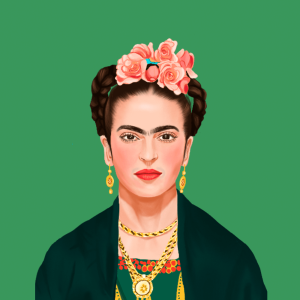
Friday Dec 29, 2023
Unraveling the Life of Hayden Herrera: A Literary Journey into the World of Art and Biography
The theme of Frida - A Biography Of Frida Kahlo
The theme of "Frida - A Biography of Frida Kahlo" revolves around the life and art of Frida Kahlo, a famous Mexican artist. The biography explores various aspects of her life, including her childhood, personal relationships, physical and emotional struggles, and her impact on the art world.
One prominent theme in the biography is the exploration of identity and self-expression. Frida Kahlo had a distinct artistic style that reflected her sense of self and Mexican culture. Through her artwork, she expressed her pain, struggles, and inner emotions, often depicting herself in her paintings. The biography delves into the ways in which her artwork served as a means for self-identification and self-expression.
Another theme in the biography is resilience and overcoming adversity. Frida Kahlo faced numerous challenges throughout her life, including a debilitating bus accident that left her with lifelong physical pain and the inability to bear children. Despite these setbacks, she continued to create art and developed her unique style. The biography emphasizes her determination to overcome her physical and emotional struggles and how these experiences influenced her artwork.
Additionally, the biography explores Kahlo's exploration of gender and sexuality. She challenged traditional gender roles and societal expectations, as seen in her self-portraits where she often portrayed herself with a unibrow and facial hair. Kahlo had both male and female lovers, and her relationships and sexual experiences are discussed in the biography, shedding light on her non-conformity to societal norms of her time.
Overall, "Frida - A Biography of Frida Kahlo" highlights the themes of identity, self-expression, resilience, and challenging societal norms. It provides a comprehensive look into the life of Frida Kahlo and her impactful contribution to the art world.
Why is Frida - A Biography Of Frida Kahlo Valued?
- Unique Perspective: This biography offers a deep insight into the life of Frida Kahlo, one of the most iconic and influential artists of the 20th century. It explores her personal struggles, relationships, and artistic journey, providing a comprehensive understanding of her life and work.
- Cultural Importance: Frida Kahlo represents a cultural and feminist icon, known for her unique artistic style and symbolism. Her biography helps to preserve and promote her legacy, allowing readers to appreciate the significance of her contributions to art and society.
- Artistic Inspiration: Frida Kahlo's life story, with all its triumphs and setbacks, serves as a source of inspiration for artists and creatives worldwide. This biography provides a glimpse into her creative process, artistic influences, and the ways in which her experiences influenced her art.
- Humanizing Portrayal: The biography delves into the personal and emotional aspects of Kahlo's life, portraying her as a complex and multidimensional individual. By exploring her relationships, experiences, and struggles with physical and emotional pain, readers gain a deeper understanding of the person behind the art.
- Historical and Social Context: The biography places Kahlo's life within the historical and social context of early 20th-century Mexico. It sheds light on the political climate, artistic movements, and societal norms of the time, helping readers to better understand the factors that shaped Kahlo's art and worldview.
Overall, "Frida - A Biography of Frida Kahlo" is valued for its ability to provide a detailed, personal, and culturally significant account of one of the most influential artists in history.
What are the key events and milestones in Frida Kahlo's life that are covered in the biography?
- Birth and Childhood: Frida Kahlo was born on July 6, 1907, in Coyoacán, Mexico. The biography covers her upbringing in a middle-class family and her close relationship with her parents.
- Early Education and Polio: The biography explores Kahlo's interest in art from an early age and her enrollment in the prestigious National Preparatory School. It also discusses her battle with polio at the age of six, which left her with a lifelong disability in her right leg.
- Bus Accident and Physical Injury: The biography highlights the life-altering event in Kahlo's life when she was involved in a bus accident at the age of 18. The accident caused severe injuries, including fractures in her spine, collarbone, and pelvis. The biography describes her extensive medical treatments and surgeries and the subsequent beginning of her artistic career during her months of recovery.
- Relationship with Diego Rivera: The biography delves into Frida Kahlo's tumultuous relationship with the renowned Mexican muralist Diego Rivera. It discusses their marriage, their affairs, and the impact their relationship had on Kahlo's art.
- Influence of Mexican Culture: The biography explores Kahlo's deep connection to her Mexican heritage and the influence it had on her art. This includes her exploration of indigenous Mexican culture, traditions, and mythology, which are evident in many of her paintings.
- Political Activism: The biography covers Kahlo's involvement in politics and her affiliation with the Mexican Communist Party. It explores her friendships with prominent communist figures and her commitment to advocating for the rights of workers and indigenous communities.
- Health Struggles: Frida Kahlo's various health issues, including her chronic pain, surgeries, and multiple miscarriages, are discussed in the biography. It highlights her resilience and determination to continue painting despite her physical suffering.
- Artistic Recognition: The biography chronicles Kahlo's rise to prominence as an artist, including her participation in exhibitions, international recognition, and the critical acclaim she received for her unique style and subject matter.
- Death and Legacy: The biography concludes with Kahlo's passing on July 13, 1954, at the age of 47. It discusses her enduring legacy as a groundbreaking artist and feminist icon, and the continued impact of her work on contemporary art and culture.
No comments yet. Be the first to say something!